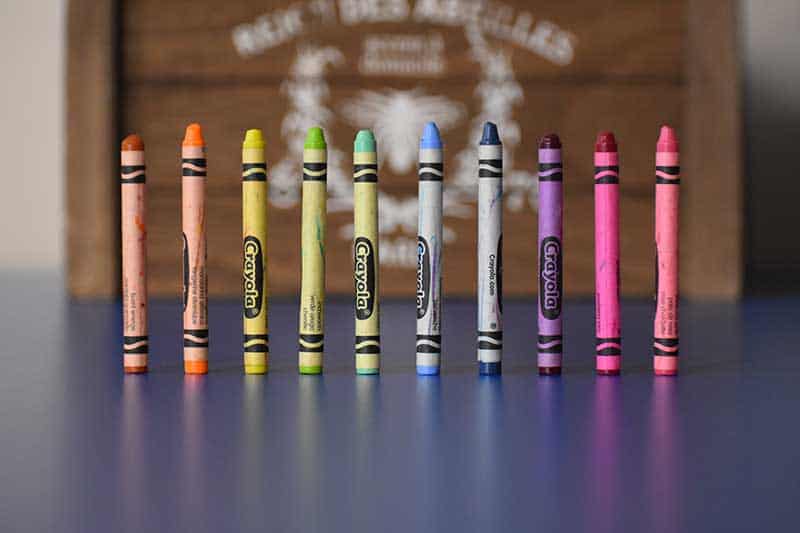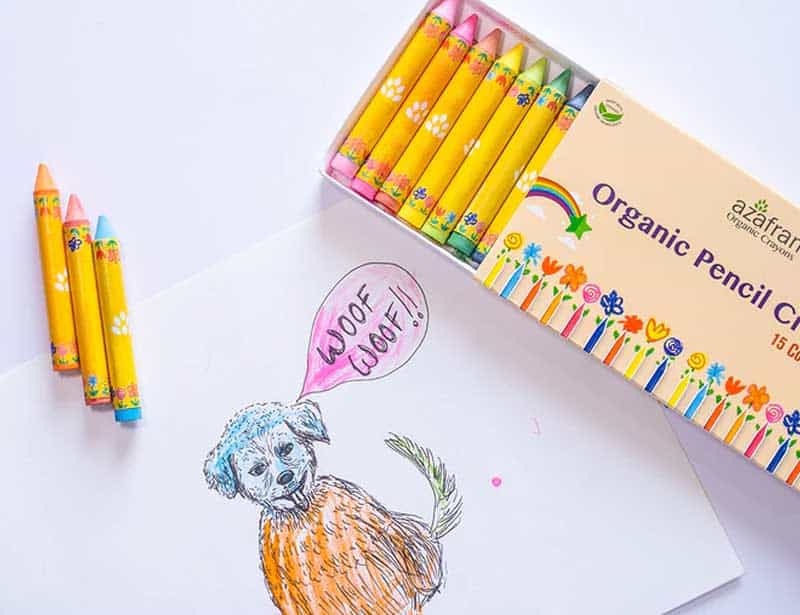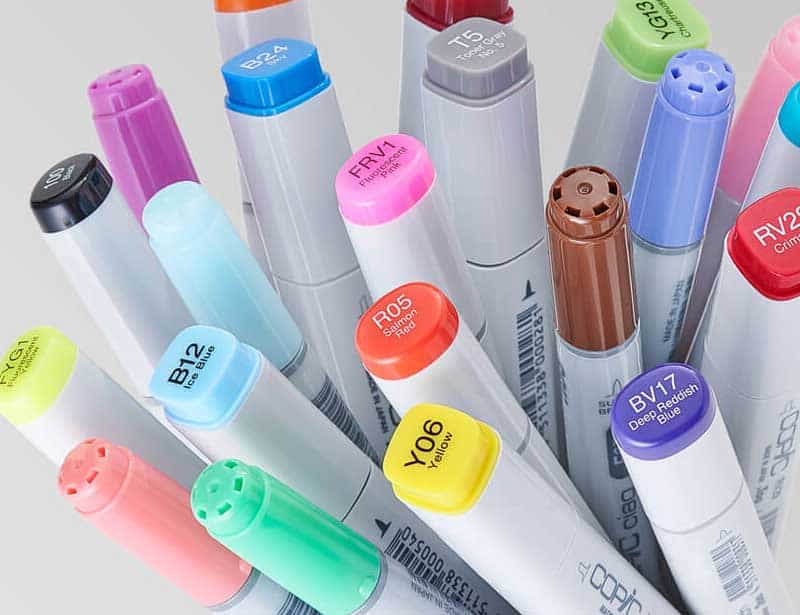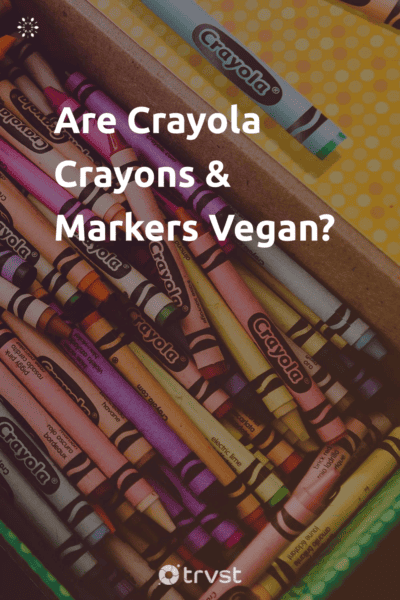Are Crayola Markers Vegan?
You likely used Crayola products during your early learning days. Crayola is one of the most popular markers, crayons, and other art supplies manufacturers. You may now have children who love those same colorful markers and crayons to learn and draw. So for many plant-conscious parents and curious minds looking for vegan art supplies, the question is - what about this leading brand? Are Crayola markers vegan?
While the company does some work to be sustainable, Crayola markers are not vegan.
This manufacturer makes art supplies that include animal products like milk, beef fat, and other animal by-products.
Related: You might also like our top picks of eco-friendly and zero-waste school supplies, and we have a bunch of recommendations for eco-friendly pens and pencils too!
History of Crayola

Crayola is a company best known for its colorful Crayola markers and crayons. The name Crayola was derived from the French word “Craie,” which means “a stick of white or colored chalk” or “colored wax,” and ”ola” from the word oily or oleaginous.
Located in Easton, Pennsylvania, Crayola is a US-based company that specializes in producing markers and crayons. Crayola has been around for over 100 years and makes millions of coloring materials and art supplies daily.
Crayola has been around since the early 1900s and is a significant art supply industry leader. Crayola first launched its markers in 1978 with just five bright colors. Today, the brand produces millions of markers and crayons in a huge array of colors and styles.
Regarding sustainability and corporate responsibility, Crayola is involved in several initiatives, including investing in 100% renewable energy for US manufacturing plants.
Also, Crayola offers a ColorCycle k-12 Marker Recovery program where the brand recovers plastics and converts them to energy.
Crayola also sources its pencils from responsibly grown forests and has committed to reducing emissions throughout its business operations.
Crayola crayons and markers are their most prominent products, widely used by teachers and students.
What are Crayola markers made of?

According to the Crayola company, marker ingredients include a plastic barrel, a porous plastic nib, a plastic cap, a cotton filament, and water-based dye.
While most of these ingredients seem straightforward, their water-based Crayola marker dyes are a bit suspicious. When looking to answer the question, "are Crayola markers vegan?" we must note that Crayola admits that their markers contain animal by-products.
For their dyes and coloring, Crayola may use animal ingredients like gelatin, animal fat, cow’s milk, honey, and shellac, which are suitable for stabilizing the colors on their markers.
Crayola markers also contain legumes, latex, red coloring, and milk casein. The company sources its animal-based ingredients from slaughterhouses that sell processed beef fat and animal by-products.
How Crayola markers are made
The manufacturer starts by putting tiny plastic beads into a molding machine to make Crayola markers. When the plastic melts, the molding machine molds them into marker barrels in seconds. Any leftover plastic goes back into the molding machine to create new marker barrels.
Manufacturers then screen print the Crayola brand and color names on the marker barrels. This is similar to screen printing on a shirt.
Afterward, the manufacturers line up the marker barrels as they move through a conveyor belt using an assembling machine.
Manufacturers then insert the end plug and ink reservoir into the barrel. Lastly, they add the marker rib and cap to the open end of the marker.
Finished markers are separated and sorted by colors, packed in cartons, and shipped to different stores.
Are Crayola markers vegan?
On the main question, “are Crayola markers vegan?” we’ve established that they are not. The brand has admitted to using ingredients from animal-derived sources. Crayola doesn’t exactly give us a clear list of all ingredients used to make their products.
But we can assume that the brand makes Crayola markers with ingredients like stearic acid, gelatin, bone char, beeswax, and other components from plant or animal sources, which you can commonly find in most markers. These ingredients help the marker to retain its color and flow better. However, these markers are not vegan-friendly.
For those looking to avoid animal products, thankfully, there are vegan alternatives you can find in the market, which we cover a little further down.
Does Crayola test on animals?
Today, many big brands in different industries contribute to animal cruelty. So you may be wondering. Are Crayola markers cruelty-free? Well, Crayola admits to using animal products but maintains till today that they do not test on animals. While this is good news, Crayola products are non-vegan and still contain animal by-products. Also, their products do not come with a cruelty-free certification.
Are Crayola markers toxic?
You may wonder, “are Crayola markers safe to use?”. Well, Crayola markers and crayons are considered non-toxic. This is one of the reasons that Crayola has become so popular.
Crayola crayons and markers are safe to use. Young children will put just about anything into their mouths, including crayons and markers. Parents want to be sure that their kids are safe when they use these art supplies, unlike many permanent markers that are very toxic.
According to the brand, toxicologists have evaluated their products and found no known toxic substances in quantities that can be harmful. Crayola products also come with the Art, and Creative Materials Institute’s (ACMI) Approved Product (AP). This means that their products meet industry quality standards.
Crayola Crayons - What are they made of?
Crayola crayons are a mix of mainly wax (paraffin, carnauba, and beeswax) and color pigment. For quality and consistency, Crayola adds animal fats. They add color pigments to paraffin wax, carnauba wax, and beeswax.
Paraffin wax and Carnauba wax are both vegan-friendly. Paraffin wax is synthetic and made from hydrocarbons. Manufacturers use them to make products like candles. On the other hand, Carnauba wax comes from the carnauba palm tree, which is used for products like paint. Lastly, beeswax comes, of course, from bees.
Are Crayola crayons vegan?
So what about Crayola crayons? Are they vegan-friendly?
Sadly, just like Crayola markers, Crayola crayons are also not vegan. These crayons contain animal-derived pigments and waxes. In addition, Crayola crayons come with that ‘distinctive Crayola smell’ from stearic acid derived from animal and beef fat. Some ingredients in Crayola crayons may be vegan-friendly. However, the rest are from animal-derived sources.
How are Crayola crayons made?
Making Crayola crayons is relatively simple. Manufacturers start by melting the paraffin wax into liquid and combining it with different pigments to create the desired color. Crayola can use around 120 different color pigment combinations.
Next, manufacturers add stearic acid, which hardens and gives the crayons some substance. Once manufacturers create the formula, they inject it into a crayon-shaped mold and leave it to cool down.
Once the crayons are cool and hardened, manufacturers remove them from the mold and set them aside for labeling. Lastly, Crayola labels the crayons using non-toxic glues and labels made from reforested wood, constructed or printed paper.
Are Crayola crayons toxic?
Just like Crayola markers, Crayola crayons are equally non-toxic. Therefore, you may not need to do anything if your kids and babies accidentally ingest some crayons. The company claims that if children eat these Crayola crayons, they won’t cause any harm because most ingredients are free of toxicants and common allergens. However, it is not advisable to eat crayons as continuous ingestion of petroleum-derived wax could be potentially toxic.
What’s that distinctive Crayola smell?
Crayola markers and crayons come with a distinctive smell. If you’ve ever used Crayola markers or crayons, that unique smell is something you won’t forget. So what is that distinct smell?
The leading ingredient manufacturers use in making Crayola markers is stearic acid. While manufacturers can also use vegetable oils and animal fats to make stearic acid, Crayola uses animal fats. We don’t know precisely how much stearic acid goes into their markers and crayons, but we can be confident that they all contain animal-derived components.
Stearic acid is a long saturated fatty acid that manufacturers get from beef fat. This beef fat in the stearic acid gives the Crayola markers their waxy texture and unique smell.
Stearic acid can solidify at room temperature and is a good hardening agent for organic molecules. You can find stearic acid in crayons and markers, soaps, detergents, and candles.
Vegan Alternatives to Crayola markers and crayons
If you’re vegan and looking for vegan alternatives to Crayola markers and crayons, here are a few alternatives you can use:
Azafran Crayons

Azafran Crayons are all natural and made from plant-based ingredients. These ingredients are free of parabens, sulfates, mineral oils, and artificial fragrances.
Azafran crayons come from a long saturated fatty acid from a mix of waxy oils, including vegetable oils, soy, and coconut oils. These vegan crayons are also hypoallergenic, which is excellent for sensitive skin.
Azafran makes other organic and vegan products, including baby care, hair, face, and fragrance products.
Wee Can Too Crayons

We Can Too veggie baby crayons are non-toxic, naturally-safe crayons made with soy waxes. They are vegan and free of wheat and dairy. You can get these veggie baby crayons from We Can Too in a set of five crayons that come in different shapes.
We Can Too offer quality art supplies made from plant-based ingredients that are non-toxic and safe for babies and toddlers.
Copic Markers

Copic offers a wide range of graphic markers. These markers are eco-friendly, vegan, and suitable for beginners, hobbyists, and professionals. In addition, Copic markers are refillable, reducing plastic waste. The Copic Sketch, one of their best sellers, comes in 358 colors.
Chartpak Markers
While Chartpak is not a vegan brand, their Original Chartpak ADMarkers and Spectra ADMarkers are vegan products. Original Chartpak vegan markers come in 25 colors and a colorless blender. The Spectra ADMarkers come in a set of 95 colors and a blender. They are also refillable. Apart from being vegan-friendly, these markers are equally non-toxic.
Faber-Castell
If you are looking for vegan-friendly art supplies and free of animal testing, these Pitt Artist brush pens from Faber-Castell are a great option. Not only are these products completely vegan, but Faber-Castell makes them sustainably using energy that comes from renewable sources. In addition, their pencils, pens, and erasers come from inorganic components, including vegetable raw materials (wax and oils) and inorganic fillers and pigments.
ZenZoi
Made with quality fiber, ZenZoi markers come in 13 fresh colors, including red, green, yellow, blue, orange, and so on. In addition, these markers come in a stylish tube/case holder that is 100% recyclable.
ZenZoi markers work great on whiteboards, glass, and non-porous surfaces. They are also free of toxins, making them safe for you and your family.
AusPen
The AusPen Carry Case contains six markers, including red, black, green, blue, purple, and orange, and six ink sets to refill your markers at any time. If you are a teacher, these vegan markers are just perfect. The brand makes its case with recyclable plastic and refillable ink bottles. According to the brand, one AusPen marker replaces 80 conventional non-refillable markers.
Mamamboo
These non-toxic, vegan crayons from Mamamboo are a great alternative to Crayola crayons. The brand makes these crayons with plant-based pigments and natural vegetable waxes, making them friendly to animals and the environment. These crayons come in varying colors, including red, yellow, blue, etc.
Final thoughts
Most of us grew up with Crayola markers and crayons. We’re just starting to ask questions like, “are Crayola markers vegan?” as we need to purchase similar products for our children and wards. Or for our art making.
Sadly, Crayola has admitted to using animal ingredients for its art supplies. Therefore, if you adopt a vegan lifestyle, it is best to stay clear of Crayola products. Thankfully, there are many alternatives, as we have listed above, that are vegan. Explore some vegan brands above to find suitable markers to purchase.
Jen’s a passionate environmentalist and sustainability expert. With a science degree from Babcock University Jen loves applying her research skills to craft editorial that connects with our global changemaker and readership audiences centered around topics including zero waste, sustainability, climate change, and biodiversity.
Elsewhere Jen’s interests include the role that future technology and data have in helping us solve some of the planet’s biggest challenges.

